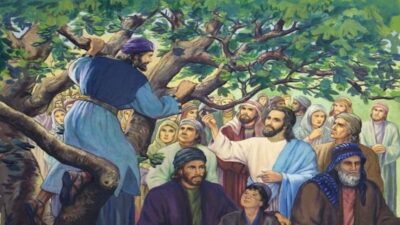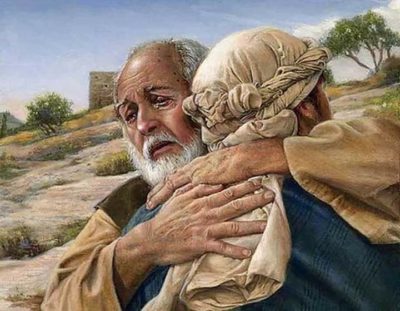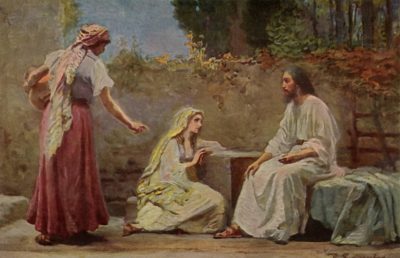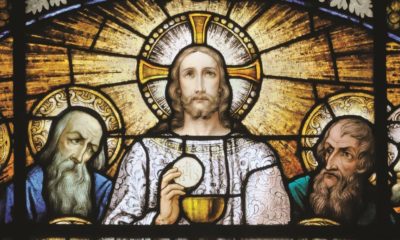August 7, 2022
|by N W
|
0 Comments
|
Eternal Life, Father Nixon, Mission, Repentance, Service, Trust
|
Second Coming
Nineteenth Sunday in Ordinary Time
August 7, 2022 — Year C
Readings: Wis 18:6-9 / Ps 33 / Heb 11:1-2, 8-19 / Lk 12:32-48
by Rev. Nixon Negparanon, Pastor
One day in 1780, the state of Connecticut was enveloped by a mysterious darkness. The same thought came to all: The Last Day had arrived. In the House of Representatives, members were heard asking for an adjournment, so that they could go home and wait for the Lord’s coming together with their families. The chairman, Abraham Davenport, made a short speech. “Either it is the day of judgment or not. If not, there is no need for adjournment. If it were the day of judgment, I would rather be found doing my duty. I wish candles to be brought.”
Brothers and sisters, the parable of today’s gospel focuses on the unpredictable return of Jesus and our need to be prepared for His return. He is saying to us, Ready or not, here I come.
Normally, when we think of being ready, we usually think of being prepared for the worst that could happen. Locks on the doors in case of thieves. Life jackets in the event of a boat accident.
Isn’t it interesting that most of us believe in preparation for many uncertainties, but not for the most important event of our lives? We carry a spare tire in our car as a preparation for a flat tire. We have insurance in preparation for our death. Fire truck in preparation for a fire. Airline stewards provide pre-flight instruction in preparation for turbulent weather. And we seek education in preparation for a good job.
Preparation, in our society, is a sign of wisdom. But think about this: Of all the preparations that we make for the things I just mentioned, not a single one is a certainty. Yet we feel compelled to prepare ourselves for them.
The return of Jesus is a certainty. We can never know precisely when He will return or when we will die, but His return is certain. We must constantly watch, being always faithful and ready, so that we may be found worthy to share in the heavenly banquet He has prepared for us.
The question of the parable is not whether or not Christ is coming again, or when He’s coming, or even how He’s coming. The point is being prepared for His coming and ready to receive Him whenever He comes, now or later.
When a family was vacationing in Europe, they found that they needed to drive three days continuously, day and night, to get to Germany. They all got into the car: Mom, Dad, and their three-year-old daughter. The little daughter had never traveled at night before. She was scared the first night in the car, seeing only the deep darkness outside the window.
“Where are we going, Daddy?”
“To your uncle’s house in Germany.”
“Have you been to his house before?”
“No.”
“Then do you know the way?”
“Maybe we can read the map.”
(Short pause.)
“Do you know how to read the map?”
“Yes, we will get there safely.”
(Another pause.)
“Where are we going to eat, if we get hungry before arriving?”
“We can stop at restaurants if we are hungry,” the Dad replied.
“Do you know if there are restaurants on the way?”
“Yes, there are.”
“Do you know where?”
“No, but we’ll be able to find some.”
The same dialog was repeated several times during the first night and also the second night, but on the third night, his daughter was quiet. The Dad thought that she might have fallen asleep, but when he looked into the mirror, he saw that she was awake and was just looking around calmly. He couldn’t help wondering why she was not asking questions anymore.
“Dear, do you know where we are going?”
“Germany, uncle’s home.”
“Do you know how we are getting there?”
“No.”
“Then why aren’t you asking anymore?”
“Because Daddy is driving.”
Because Daddy is driving. Yes, brothers and sisters, our Father is driving. We may not know the destination, and sometimes we may just know it as the child knew it – Germany — without understanding what or where it really is. In the road of life that we follow, there are many uncertainties and distractions. We do not know where the road will take us. We do not know when it will end. But one thing is certain: At the end of life’s journey, Our Lord will be there to meet us, to welcome us into the heavenly kingdom, if we have prepared ourselves.
Preparation cannot be a “sometime” thing but living each moment of our life for Jesus. If we can do that, we will be prepared to greet our Master whenever He comes.
How can one be prepared in this matter? If you can still remember when Jesus talks about the Last Judgment, He makes it clear that this preparation or preparedness would be measured by our readiness to serve the people we meet. He said, “What you do to the least of my brothers and sisters, you do this unto me.” We have to complete the task entrusted to us every day and be at peace with, and at the service of, our neighbor now, to be ready for His Second Coming.
Another way is to be faithful to the life and mission of Jesus, as we await the end time, His Second Coming. Despite criticisms, rejection, pain, and suffering, let us remain faithful to the love of the Father, as Jesus did. Let us fulfill the mission entrusted to us, that is, to proclaim God’s reign to all.
God loves faithfulness and rewards those who are faithful to Him. What is faithfulness? It means keeping one’s word or promise, and commitment, no matter how tough or difficult it gets. Faithfulness is a character trait of God and one that He expects of us.
May Jesus Christ be praised.
KEEP READING
 540-586-8988
540-586-8988 










